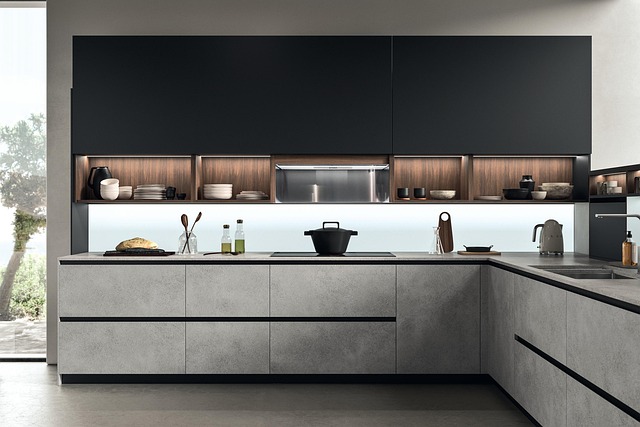A green kitchen renovation focuses on selecting eco-friendly materials like recycled glass, bamboo, and reclaimed wood for countertops and cabinets, while flooring options include cork and vinyl made from recycled content. These choices reduce environmental impact, enhance energy efficiency, and offer unique aesthetics. Upcycling old items and using natural materials also contribute to sustainability, aligning with environmentally conscious values in modern kitchen design. Prioritizing durable materials and energy-efficient appliances ensures a long-lasting, sustainable kitchen transformation.
“Transforming your kitchen into a modern, sustainable oasis? In this guide, we explore how to create a stunning green kitchen renovation. Discover eco-friendly materials from countertops to flooring, and learn about energy-efficient appliances that reduce utility bills and environmental impact. We’ll show you waste reduction strategies, innovative water conservation techniques, and design tips for a kitchen that’s both beautiful and responsible. Embrace the future of culinary spaces with our comprehensive approach to sustainable kitchen remodels.”
- Choosing Eco-Friendly Materials
- – Exploring sustainable alternatives for countertops, cabinets, and flooring
- – Benefits of using recycled, upcycled, and natural materials
- – Tips for selecting long-lasting, low-maintenance options that reduce waste
Choosing Eco-Friendly Materials
When embarking on a green kitchen renovation, selecting eco-friendly materials is a key step in creating a sustainable space. Opting for recycled or sustainably sourced options not only reduces your environmental impact but also brings unique aesthetics to your remodel. For countertops, consider materials like recycled glass, bamboo, or reclaimed wood, each offering a distinct look while minimizing waste.
Flooring is another area where eco-conscious choices shine. Look for options such as cork, bamboo, or vinyl flooring made from recycled content. These materials are not only durable but also provide excellent insulation, contributing to energy efficiency in your kitchen. Remember, every material choice matters in a modern kitchen remodel focused on sustainability.
– Exploring sustainable alternatives for countertops, cabinets, and flooring
In a modern green kitchen renovation, exploring sustainable alternatives for countertops, cabinets, and flooring is paramount. Instead of traditional materials like granite or marble, which can have significant environmental impacts due to extraction and transportation, consider eco-friendly options such as recycled glass, bamboo, or engineered wood. These materials not only reduce your carbon footprint but also offer unique aesthetic appeal and durability.
For instance, recycled glass countertops are made from post-consumer waste, minimizing the need for new resource extraction. Bamboo cabinets, known for their rapid growth and renewable nature, provide a stylish and sustainable alternative to conventional wood. Similarly, flooring options like cork or linoleum are not only eco-friendly but also offer excellent insulation, moisture resistance, and ease of maintenance, making them ideal choices for any green kitchen renovation.
– Benefits of using recycled, upcycled, and natural materials
In the realm of green kitchen renovations, opting for recycled, upcycled, and natural materials offers a myriad of benefits. These choices not only contribute to reducing waste but also minimize the environmental impact associated with traditional manufacturing processes. Using recycled materials, such as repurposed wood or reclaimed tiles, lends a unique character to your space while fostering sustainability. Upcycling, which involves transforming old or discarded items into new kitchen elements, is an innovative way to create distinctive features and save resources. Natural materials like bamboo, cork, or stone not only enhance the aesthetics of your kitchen but also provide long-lasting durability and eco-friendliness.
Moreover, these materials often require less energy for production and processing compared to their conventional counterparts, making them a smarter choice for environmentally conscious homeowners. By incorporating recycled, upcycled, and natural materials into your modern kitchen remodel, you contribute to a more sustainable future while creating a beautiful, one-of-a-kind culinary space that reflects your values.
– Tips for selecting long-lasting, low-maintenance options that reduce waste
When embarking on a green kitchen renovation, selecting durable and low-maintenance materials is key to achieving a sustainable space. Opting for long-lasting options reduces the need for frequent replacements, thereby minimizing waste generation. Consider natural, recycled, or upcycled materials such as solid wood, bamboo, or reclaimed stone for countertops and flooring. These choices not only offer aesthetic appeal but also ensure longevity.
Additionally, focus on efficient appliances that meet energy-saving standards. Modern, energy-efficient models consume less power, reducing your carbon footprint. Choose devices with proper insulation and advanced technology to minimize heat loss and waste. Regular maintenance and timely repairs further extend the lifespan of these appliances, contributing to a more sustainable kitchen renovation.
In conclusion, a green kitchen renovation isn’t just about aesthetics; it’s a conscious choice to minimize environmental impact. By opting for eco-friendly materials like recycled countertops, upcycled cabinets, and natural flooring, we can create lasting spaces that are kind to the planet. These sustainable alternatives not only reduce waste but also offer durability and low maintenance, making them a smart investment for any homeowner looking to embrace a more eco-conscious lifestyle.
